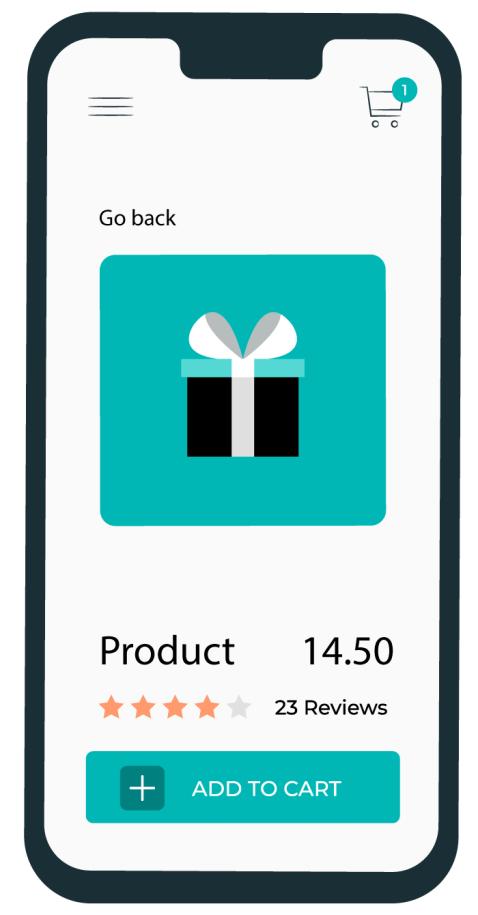- Homepage
- Our expertise
- Marketing
- E-commerce
E-commerce: What is it and how do you start it?
What exactly is e-commerce or ecommerce? E-commerce, also known as electronic commerce, is becoming increasingly popular over the years. But, how do you use e-commerce as a starting company? We would like to help you start your e-commerce webshop.
What is e-commerce?
Let's start at the beginning, because what exactly is e-commerce? E-commerce means electronic commerce. It is simply the online buying and selling of products and services through a webshop.
What is included by e-commerce?
To begin with, you need to ask yourself the question, "what is covered by e-commerce?" For example, you can subdivide e-commerce based on the type of product, type of customer contact, and where the trade takes place.


E-commerce based on product type
We will elaborate here on the type of product. You can classify products online into three different groups, namely: physical products, digital products, and service-oriented products.
What are physical e-commerce products?
Physical e-commerce products are products that you can order online and actually hold in your hands, such as electronics, clothing, and household goods. Companies that conduct this type of commerce are also called "the typical online retailers".
What are digital e-commerce products?
Digital e-commerce products are those that exist only digitally, such as an e-book, online courses and websites. They are downloadable or provide access via a computer, tablet or mobile phone.
What are service-oriented e-commerce products?
Service-oriented e-commerce products are online services offered by a company for which a customer pays. As an example, let's take SEO optimisation for a website. Customers pay for the service that is performed by specialists, among others.
Outsource the SEO optimisation of your website?
The Dare Company is happy to help you with this!
E-commerce based on customer contact
- Business to-Business (B2B): trade between two companies. (Mailchimp)
- Business-to-Consumer (B2C): trade between a business and a consumer. (Wehkamp)
- Consumer-to-Consumer (C2C): trade between consumers. (Marktplaats)
- Business-to-Business-for-Consumer (B2B4C): Trade from business to business for consumers (Picnic)
What is Business-to-Business e-commerce? (B2B)
B2B e-commerce exists when companies trade with each other online. This mainly concerns (online) services that are traded. Think for example of our SEO specialists who help you with the SEO optimisation of your website. In this situation, we speak of B2B e-commerce.



What is Business-to-Consumer e-commerce? (B2C)
B2C e-commerce exists between companies that trade products or services online directly to consumers. For example: you are looking for a black T-shirt and you visit the website of Wehkamp. You order the black T-shirt which is delivered to your home after a few days. This is an example of B2C e-commerce.
What is Consumer-to-Consumer e-commerce?
C2C e-commerce exists between consumers trading online with each other. If you sell something to another consumer on an online trading platform, such as Ebay, you are trading via an online platform. At that point there is C2C e-commerce.
What is Business-to-Business-for-Consumer e-commerce? (B2B4C)
B2B4C e-commerce derives when companies partner with other companies to market a product or service to consumers. For example, consider Picnic, which resells the products of Unilever, among others, to consumers online. This is what we call B2B4C e-commerce.
E-commerce based on location
Where does e-commerce take place? The 'e' in the word e-commerce actually gives it away, namely electronic, or online. This sounds logical, but there is a difference in where it takes place online. Examples are: online shops. You can think of the fact that nowadays almost every physical company also trades online. But also online marketplaces and social media. For example, E-bay itself, Marketplace of Facebook, and its promotion.
Different types of e-commerce platforms
What types of e-commerce platforms are there? We will explain the two most common e-commerce platforms in the Netherlands.

WooCommerce
WooCommerce is one of the most widely used e-commerce platforms in the world. WooCommerce is a free plugin for the CMS (content management system) Wordpress. It is available to a large group of people around the world because it has a user-friendly installation process in WordPress.
Shopify
Shopify is one of the most widely used e-commerce platforms in the world besides WooCommerce. Shopify requires no installation and no technical knowledge. This makes it easy for you to put a webshop online.
Magento
Magento is an open-source CMS platform that manages large webshops that can be custom-built down to the smallest detail. It allows you to create unique webshops and easily customize them yourself. Have you chosen Magento? We will gladly help you set up your webshop!
E-commerce and Google
These days, Google is also indispensable when talking about e-commerce. Google Shopping provides convenience and findability, while Google Analytics provides insight and overview.
E-commerce Google Shopping
Did you already know that anyone with an e-commerce website can also sell their products through Google Shopping? Good news, you will soon be able to answer this question! Google Shopping is the first to come up when you search for almost any type of product via the popular search engine. So it's a missed opportunity for you if you don't link your e-commerce website to Google Shopping. Not only will the listings rank high in Google, but it will also be easier to connect with your customers. Also, you can make Google AdWords better visual together with Google Shopping.
E-commerce Google Analytics
No visitors on your website means no sales. Therefore, it is important to understand the source of your visitors, but also the behavior of your visitor on your website is certainly not unimportant. With Google Analytics you can follow the source until the exit page of your webshop. More about this? Read E-commerce Google Analytics
Advantages of e-commerce
Buying and selling products and services online has its advantages, namely:
- E-commerce offers a wider range of products
- E-commerce sells, compared to a physical store, to a wider audience
- E-commerce is not bound by opening hours so that trading can take place 24/7
Starting E-commerce: phases e-commerce
Answering the question, "how do you start with e-commerce?" will be a piece of cake for you, after reading the steps below. Here is a brief summary of the three main steps you should definitely not forget for setting up a successful e-commerce platform:
- Step 1: Think about what kind of product or service you want to sell. As previously described, there is a difference in approach. In addition, look carefully at who you want to reach (target audience), what your competitors are doing, and what you can earn with it.
- Step 2: Think about what kind of platform you want to use for this. We recommend several types of e-commerce platforms. For example, you can use our own CMS (Dare to Manage), WooCommerce and Shopify.
- Step 3: Think about how you want to communicate your chosen form of e-commerce to your chosen target audience. For example, you can use social media to attract more visitors to your created webshop.

Frequently asked questions about E-commerce
Below are some frequently asked questions about E-commerce with their answers.
What is E-commerce?
E-commerce involves companies selling their goods by using the Internet. The company creates a website or has one developed on which they showcase their products. The visitor can then easily place an order through this website. The product is then delivered through the mail.
What does E-commerce mean?
The "E" of E-commerce stands for electronic. Therefore, E-commerce means Electronic Commerse.
How does E-commerce work?
You speak of E-commerce when you place an order for a product or service via the Internet. The website visitor can easily place an order from the site and the company behind the website then delivers the product.
Why deploy E-commerce?
It is impossible to imagine life without the Internet. We see more and more companies taking the leap to online. E-commerce can be a good addition to the business plan because you realise a new sales channel as a company. However, we see that many companies struggle with the interpretation of e-commerce. The Dare Company helps companies to achieve optimal returns from their e-commerce website!


